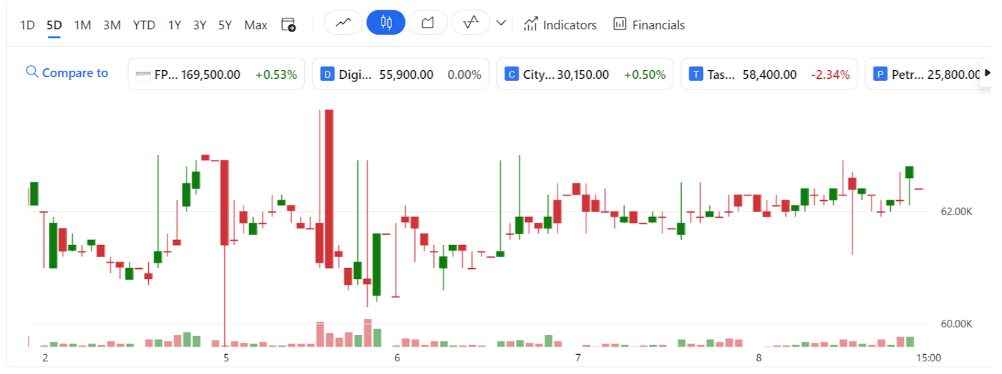Day Trading in Vietnam



Vietnam’s economy has significantly transformed into a central manufacturing hub for electronics and textiles. Its large and relatively young workforce, highly competitive labor costs, and strategic geographic location, make it attractive for online investment.
Vietnam is also part of various regional economic agreements, including the Association of Southeast Asian Nations (ASEAN) and the Comprehensive and Progressive Agreement for Trans-Pacific Partnership (CPTPP), which help to facilitate trade and investment with countries globally.
With Vietnam’s rapid economic growth, day trading stocks, indices and ETFs have become increasingly popular. This dynamic and growing economy offers potential benefits for those willing to seize the opportunities.
Quick Introduction
- The Vietnam Securities Depository Centre data reveals that the market has welcomed significant new domestic individual accounts in recent years, a testament to the potential of day trading in Vietnam.
- The Ho Chi Minh Stock Exchange (HOSE) and the Hanoi Stock Exchange (HNX) are the two primary stock exchanges in Vietnam. Their operations are straightforward, helping traders grasp market dynamics.
- It’s crucial to be aware of and adhere to the regulations set by the State Securities Commission of Vietnam (SSC) and State Bank of Vietnam (SBV). This ensures that your day trading activities are conducted within the legal framework, providing a sense of security.
Top 4 Brokers in Vietnam
Based on our hands-on tests, these 4 brokers are the front runners for day traders in Vietnam:
Day Trading Platforms in Vietnam
What Is Day Trading?
Day trading is a fast-paced approach to online investing whereby traders open and close positions, for example on Vietnamese stocks, within the same trading day. It offers the potential for high rewards but also comes with risks.
Active Vietnamese traders may be interested in stocks listed on the HOSE (largest exchange) and HNX (smaller exchange). There is also the Unlisted Public Company Market (shares not listed on HOSE or HNX but registered with SSC), though with lower volumes and liquidity, this is less suitable for day trading.
Forex trading is heavily restricted in Vietnam. Some residents may want to speculate on the value of international currencies like the US Dollar and Euro, though this may require turning to higher-risk overseas firms.
Vietnam is also a significant exporter of commodities like coffee and rice, providing short-term trading opportunities.
Is Day Trading Legal In Vietnam?
Day trading is legal in Vietnam. However, it is subject to regulations and guidelines set by the State Securities Commission of Vietnam (SSC) and State Bank of Vietnam (SBV).
The SSC is the main regulatory body overseeing the securities market in Vietnam, including activities related to day trading.
Day traders should execute their trades through licensed securities companies (brokerages), which provide the necessary trading platforms and services. That said, there are limited domestically-licensed firms so traders often use international providers.
The SSC may impose certain limits on daily transactions to maintain market stability and prevent excessive speculation.
Is Day Trading Taxed In Vietnam?
Day trading is taxed in Vietnam. The tax system includes several taxes that may apply to profits from trading financial securities like stocks, including capital gains tax.
Here are the key considerations:
- Capital gains tax: Profits from the sale of securities, including stocks, are subject to capital gains tax. The capital gains tax rate for securities trading in Vietnam is typically 0.1% of the sale proceeds; the tax is calculated based on the total amount received from selling the stock, not just the profit.
- No deduction for losses: Vietnam prohibits traders from deducting losses from their taxable gains. The 0.1% tax applies to each sale regardless of whether the trade was profitable.
- Dividend tax: If you receive dividends from the stocks you own, these dividends are subject to a withholding tax. The standard rate for dividend tax is 5% for residents.
Day traders must comply with tax reporting requirements. Fortunately, brokerages may withhold taxes at the source, simplifying the process.
For accurate tax reporting, keeping detailed records of all trades, including purchase and sale prices, dates, and associated costs, is essential.I also recommend consulting a tax professional or advisor familiar with Vietnam’s tax laws to ensure you understand your tax liabilities and complete proper reporting.
Getting Started
Day traders in Vietnam can get started in three straightforward steps:
- Choose a broker. Select a licensed company in Vietnam. Key things to weigh are access to financial markets, for example, can you trade Vietnamese stocks or speculate on currencies like the Vietnamese Dong? Our evaluations show these tradable assets aren’t widely supported on trading platforms, but global markets are.
- Open an account. Provide the necessary documents (ID, bank account details) to open a trading account. For example, you can submit a copy of your Citizen Identification Card (Căn cước công dân in Vietnamese). Then you can deposit funds in your account. Brokers with VND accounts make deposits and withdrawals convenient for active Vietnamese traders.
- Place trades. You can now start placing day trades by analyzing market trends and news before the market opens, whether local or international financial markets. Sell all your holdings by the end of the trading day to avoid overnight risks.
A Trade In Action
To help you understand how a day trade could work in practice, let’s explore an example on a Vietnamese stock.
Background
Mobile World Investment Corp. offers trading, repair, and maintenance services for phones, cameras, and household appliances. It also provides information technology, digital services, and electronic equipment manufacturing equipment.
As one of the most traded stocks in Vietnam, traded on HOSE, it’s noted for its significant daily movements. This makes it particularly attractive for day traders looking to scalp a small movement but bank a significant profit if they have their trading costs under control.
Research And Analysis
For most of my day trades involving stocks, I use naked charts, meaning I only use candlesticks to indicate price action.
Price action is often depicted graphically in a candlestick, bar, or line chart. When analyzing price action, I use two general factors to identify the price direction and determine the direction of the volume.
If a security’s price moves upward while the volume increases, the market has strong conviction, as many investors are buying at the increasing price. Alternatively, if there has been low volume, the price action may not be as convincing, as only a few investors choose to invest at the current pricing levels.
I often look for candlesticks with long tails/wicks and small bodies to predict volatility and the potential for a momentum change. With this trade, we can see the long wick resulting in a daily low of the stock, which had been in a bullish channel for several days after recovering from a sell-off earlier in the week.

Entry And Exit
Based on the company’s fundamentals and technical analysis, I believed the stock was oversold and would recover/revert to the mean. However, I needed a reason to enter, and the daily low printed in the mid-morning session provided the ideal opportunity.
I shot for a 20-point gain and used 1:1/R:R; risking a 20-point trailing stop-loss order and 20-point profit-limit order. I closed the trade with a modest profit at the EOD (end of day).
Bottom Line
Day trading in Vietnam is a dynamic and potentially lucrative activity, but it requires a deep understanding of the market, strict risk management, and adherence to regulatory and tax obligations.
By approaching short-term trading with the right mindset, discipline, and knowledge, traders can navigate the complexities of Vietnam’s stock market and potentially capitalize on its growth potential.
To get started, see DayTrading.com’s selection of the best day trading platforms in Vietnam.
Recommended Reading
Article Sources
- Association of Southeast Asian Nations (ASEAN)
- Comprehensive and Progressive Agreement for Trans-Pacific Partnership (CPTPP)
- The Vietnam Securities Depository Centre (VSD)
- The Ho Chi Minh Stock Exchange (HOSE)
- Hanoi Stock Exchange (HNX)
- State Securities Commission of Vietnam (SSC)
- State Bank of Vietnam (SBV)
- Mobile World Investment Corp
- Vietnam ranked 62nd in GDP - GlobalData
The writing and editorial team at DayTrading.com use credible sources to support their work. These include government agencies, white papers, research institutes, and engagement with industry professionals. Content is written free from bias and is fact-checked where appropriate. Learn more about why you can trust DayTrading.com



